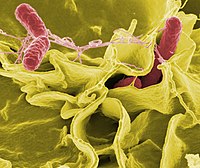
Photo from wikipedia
Blueberry have a short shelf life when fully ripe and susceptible to contamination of various pathogens. Our study investigated the effect of pulsed light (PL) on inactivation of Salmonella on… Click to show full abstract
Blueberry have a short shelf life when fully ripe and susceptible to contamination of various pathogens. Our study investigated the effect of pulsed light (PL) on inactivation of Salmonella on blueberries and its impact on shelf-life, quality attributes and health-benefit compounds of blueberries. Dry PL (6J/cm2) and water-assisted PL (samples were agitated in water during PL treatment; 9J/cm2) along with two controls, dry control (untreated) and water-assisted control (water washing without PL), were applied to blueberries with subsequent storages at room temperature (3days) or 5°C (7days). For Salmonella inactivation, dry PL treatment achieved 0.9 and 0.6 log reduction of Salmonella for spot and dip inoculation, respectively; while the water-assisted PL treatment reduced Salmonella by 4.4 log and 0.8 log for spot and dip inoculation, respectively. The water-assisted PL treatment resulted in Salmonella populations significantly lower than the dry control after storage regardless of the storage temperature and inoculation method. Neither dry nor water-assisted PL treatments improved the shelf life of blueberries even though direct inactivation of natural yeasts and molds were achieved. Surface lightness was instantly reduced after both dry and water-assisted PL treatments. Compared with the dry control, the two PL treatments did not reduce the firmness of blueberries. Weight loss was increased for the dry PL treated samples, but not for the water-assisted PL treatment for both storage conditions. Delayed anthocyanins accumulation and reduced total antioxidant activity were induced by both PL treatments at the end of storage at room temperature, while slight enhancement in total phenolics content was achieved by water-assisted PL treatment. In conclusion, the water-assisted PL treatment could effectively decontaminate Salmonella on blueberries while showed minimal or no impact on the shelf-life, quality attributes and health-benefit compounds of blueberries. PL processing parameters need to be further evaluated and optimized before possible application in the blueberry industry.
Journal Title: International journal of food microbiology
Year Published: 2017
Link to full text (if available)
Share on Social Media: Sign Up to like & get
recommendations!